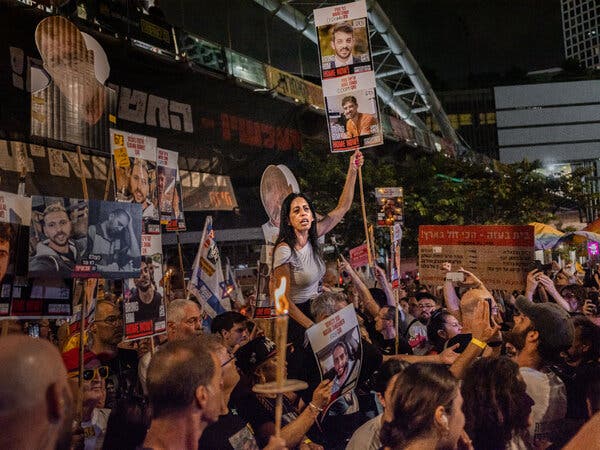UPDATE: Families of Israeli hostages held in Gaza urgently call for a nationwide strike on Sunday to demand a cease-fire with Hamas, aiming to secure the release of their loved ones. This comes as Israel intensifies its military campaign in the region, raising concerns for the hostages’ safety.
The Hostage Families Forum, an advocacy group representing the families, stated, “Silence enables their sacrifice on the altar of an endless war without purpose or goal.” They urge all citizens to participate in the strike to amplify their plea for peace and action.
The strike follows Prime Minister Benjamin Netanyahu’s announcement that Israel plans to expand military operations in Gaza, specifically targeting Gaza City, where countless Palestinians are seeking refuge. The Israeli security cabinet has unanimously agreed to “take over” this crucial area, signaling a significant escalation in the ongoing conflict.
Despite the families’ desperate call, participation remains uncertain as the Histadrut, Israel’s largest labor association, has ruled out involvement. Arnon Bar-David, the Histadrut leader, expressed frustration, stating, “Unfortunately, and although my heart is bursting with anger, it has no practical outcome.” His association previously joined a strike last year that failed to shift government policy.
The backdrop of this urgent situation includes the abduction of approximately 250 individuals by Hamas during the attack on October 7, 2023, which ignited the ongoing conflict. Since then, over 100 hostages have been released during temporary cease-fires, while the bodies of others have been recovered by Israeli forces. However, reports indicate around 20 living hostages and the remains of another 30 are still unaccounted for in Gaza, heightening tensions and fears for their safety.
Among those still held captive is Evyatar David, who was recently seen in a distressing Hamas video, prompting further anxiety among families. Efforts to escalate military action may jeopardize their lives, leading relatives to fear that Israeli strikes could target areas where hostages are being held.
Anat Angrest, whose son Matan Angrest was abducted during the attack, voiced her anger at a press conference, stating that the government could have negotiated for Matan’s return much sooner. “They’re fighting to bring him back — but in practice, they’re putting both his life in danger and their own,” she said, highlighting the emotional turmoil faced by families of the captives.
With the Israeli military likely needing weeks to mobilize enough reserve soldiers for operations in Gaza City, there remains a narrow window for potential diplomatic efforts to secure a truce. The urgency of these developments cannot be overstated, as families grapple with the reality of their loved ones’ fates amid escalating military actions.
As the nation prepares for the upcoming strike, the collective voice of the families of hostages may resonate deeply, pressing the government to reconsider its strategies in light of the human cost of the ongoing conflict. The situation is fluid, and updates are expected as negotiations and military actions unfold.
